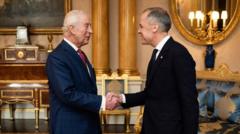In a striking move reflective of Canada's evolving identity, Prime Minister Mark Carney has invited King Charles III to address the Canadian Parliament, marking the first time a British monarch will deliver the Speech from the Throne in over 50 years. This invitation comes in the wake of a transformative decade for Canada’s relationship with the British monarchy, particularly in light of rising tensions with U.S. President Donald Trump, who has controversially suggested that Canada could function as the 51st state of America.
Historically, Canada has walked a tightrope in its ties to the British Crown, balancing a desire for sovereignty with colonial legacy. Less than a decade ago, former Prime Minister Stephen Harper's actions to highlight these ties sparked political backlash, as the country was becoming increasingly aware of its own distinct identity apart from Britain. After struggles during the 19th and 20th centuries to assert autonomy, this invitation represents a renewed embrace of Canada's royal connections, indicating a shift within the Liberal government towards a more traditional stance on monarchy.
The strategic nature of Carney's invitation appears to be a calculated response to the geopolitics surrounding U.S.-Canada relations. Trump’s agenda has frequently undermined Canadian independence, using trade tariffs to assert dominance and dismissed the country’s sovereignty. Carney’s invitation serves both as a nod towards the historical ties that bind Canada to the Crown and as a strategic message to assert Canada’s unique identity to an international audience amidst growing American influence.
Royal historians have hailed this move as an affirmation of Canada’s sovereignty and cultural uniqueness, sending a definitive message to both the United States and the broader global community about reaffirming the ties that define the nation. While many Canadian citizens exhibit indifference towards the monarchy, this event is poised to reignite interest and underscore Canada’s commitment to its own traditions.
As preparations for the King's visit ramp up, the focus remains not only on the ceremonial aspects but the political implications surrounding it. Carney hopes that this moment encapsulates a more robust relationship with the monarchy and signals a commitment to establishing stronger ties with Europe while confronting challenges posed by U.S. policies.
King Charles’ planned visit is anticipated to engender both curiosity and celebration while serving as a reminder of the complexities inherent within Canada’s historical narrative. As the King's role as head of state is revisited, the monarchy’s function amidst modern Canadian political life comes under scrutiny, creating an opportunity for renewed dialogue on colonial legacies and reconciliation efforts with Canada's Indigenous populations.




















